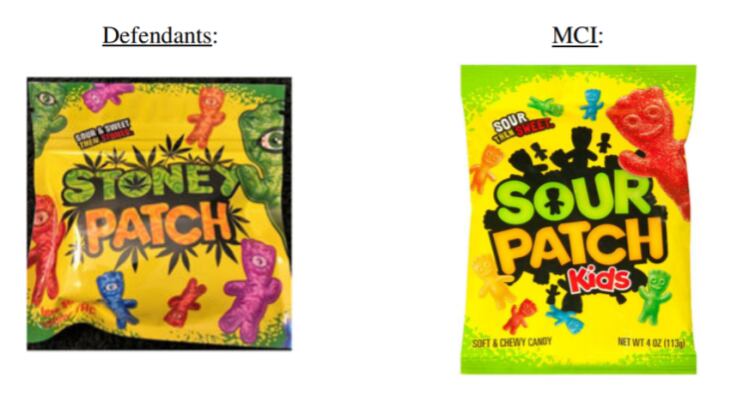STONEY PATCH – available via sites such as lifted, kushfly, greenrush, flybuds and leafedin and selected physical cannabis dispensaries in California – “is a virtual knockoff of MCI’s original SOUR PATCH packaging,” thus making them “more appealing to children and likely to be mistakenly consumed by children,” argues Mondeléz Canada Inc in a complaint* filed in California on July 19.
“There has been a growing trend among makers of cannabis products, including edible products infused with tetrahydrocannabinol (THC), to market their products by copying and misappropriating the colors, flavors, names and packaging of popular snacks and candies.”
California’s Medicinal and Adult-Use Cannabis Regulation and Safety Act expressly prohibits the use of packaging and labeling designed to appeal to children or which could be easily confused with commercially sold candy or foods that do not contain cannabis, notes the complaint.
'Defendants have taken a series of deliberate measures to shield themselves from detection by authorities'
In "complete disregard of California’s law, of concerns for public safety, and of MCI’s rights, Defendants intentionally have designed their THC gummy products to copy MCI’s long-established SOUR PATCH brand of gummy candies," adds Mondeléz Canada, which seeks damages and injunctive relief for willful trademark infringement, trademark dilution, and unfair competition.
The defendants, meanwhile, “do not have a website or provide any contact information online” and “have taken a series of deliberate measures to shield themselves from detection by authorities [the packaging does not identify the maker of the gummies]," claims Mondeléz Canada Inc, whhich has sent multiple letters about STONEY PATCH gummies to the Manufactured Cannabis Safety Branch of the California Department of Health, but says that, "to date, no action has been taken."
Thousands of dollars' worth of the products were seized by the Collier County sheriff’s office in Florida in May, according to a posting on the office's facebook page noting that, "State statutes prohibit marijuana edibles from being packaged in a way that is attractive to children or made in a form that resembles candy."
Attorney: No laughing matter for Mondeléz Canada
So what do attorneys specializing in intellectual property law make of the case?
Joel Rothman, attorney at Schneider Rothman Intellectual Property Law Group, told FoodNavigator-USA that parody can be used as a defense in trademark infringement cases, but said the case in question was likely no laughing matter.
“The STONEY PATCH kids are obviously attempting to use parody as a defense to trademark infringement. The kids are not from the sour patch, they are from that other patch where kids are not sour but …. mellow? But is it enough of a parody to escape a claim of trademark infringement?”
In an oft-cited case (Schieffelin & Co. v. Jack Co. of Boca) challenging the sale of popcorn in a green champagne shaped container under the name ‘DOM POPINGNON – CHAMPOP’ in a label similar to that of DOM PERIGNON champagne, noted Rothman, “The court held that the popcorn had elements of parody but not enough to invoke first amendment protections.”
In other words, the parody was not strong enough to overcome a likelihood of confusion.
In the STONEY PATCH case, “The stoned kids seem too poor a parody to invoke first amendment protection," added Rothman. "And unless I have been smoking something, I predict they will find litigation to be a sour experience.”
'This is a blatant misappropriation of intellectual property'
Kevin Bell, a principal at law firm Porzio, Bromberg & Newman, said Mondeléz had "a very strong case and asserted all the right claims.
"This is a blatant misappropriation of intellectual property... STONEY PATCH went the whole nine yards to knock off Mondeléz's branded products. My guess is whoever did the artwork had a bag of Sour Patch Kids right in front of them [although] STONEY PATCH thought it was being clever by making certain minor distinctions [eg. the candy figures have one eye on STONEY PATCH instead of two on the Sour Patch packaging etc etc]."
He added: "The children's toy and arts and crafts industries are notorious for these types of IP issues. It has been prevalent in the conventional food and beverage industry as well. We are now seeing an increase in sports nutrition markets as brand awareness and the use of branded ingredients becomes more critical to a company's continued success.
"This was a bad idea by STONEY PATCH and at the wrong time, when regulatory and law enforcement agencies are focused on safety and legal issues around cannabis and CBD products."
*The case is Mondeléz Canada Inc (MCI) v Stoney Patch and DOES 1-10, 2:19-cv-06245 filed July 19 in the US district court, central district of California, western division.

